
David Cliff/NurPhoto/PA Images
Latest coronavirus news as of 5 pm on 29 October
Coronavirus cases rising sharply in England, swab testing survey finds
Coronavirus infections in communities in England may be rising by as much as 96,000 new cases per day, according to the latest results from Imperial College London’s REACT-1 study. Using random swab testing of 85,000 people, researchers found that about one in 78 people in England had the virus between 16 and 25 October, up from one in 167 people between 18 September and 5 October. This is equivalent to 96,000 new infections each day. The researchers estimate that England’s R number – the number of people each person with coronavirus infects – is now 1.6, up from 1.1 in late September. They estimate that infections are doubling every nine days, compared to every 29 days previously, and that they are rising across all age groups, with the largest increase in infections seen among people aged 55 to 64. “The measures that were in place over the past two months across most of Europe were clearly insufficient to prevent the new large growth of infected cases and fast spread of the virus,” said Igor Rudan at the University of Edinburgh in a statement. “It is particularly concerning that the fastest increase in the number of infections is being seen in the age groups of 55-64 years and 65 or more years of age,” he said. The severity of covid-19 and the risk of dying from the disease both rise with age.
Both France and Germany have announced a tightening of restrictions to try to curb surging coronavirus cases. France will enter a second nationwide lockdown starting on Friday to last until at least the end of November, and Germany is imposing a one-month partial lockdown from 2 November after reporting two days with record increases in daily new cases. UK housing minister Robert Jenrick today said that the UK government does not want to impose a second national lockdown in England. “We know that has some effect on bearing down on the virus but we also know it’s immensely disruptive in other regards to people’s lives and livelihoods and broader health and wellbeing, so we will do everything we can to avoid that situation,” he told Sky News. Scotland today announced a new five-tier system of coronavirus restrictions coming into force on Monday, although no areas of the nation will be put under the highest level of restrictions. Spain’s Catalonia region closed its borders today in an effort to tackle spreading infections. The ban on entering or exiting the territory will last for 15 days.
Advertisement
Other coronavirus news
US government health advisers have warned that aggressive mitigation measures will be necessary to curb the rapid spread of coronavirus cases in the middle and west of the country, according to a report from the White House coronavirus taskforce seen by CNN. “If things do not change, if they continue on the course we’re on, there’s gonna be a whole lot of pain in this country with regard to additional cases and hospitalisations, and deaths,” said US health adviser Anthony Fauci in an interview with CNBC on Wednesday. Thirteen US states, mainly in the midwest and west, reported record numbers of covid-19 hospitalisations on Wednesday, according to analysis by Reuters.
An update to the NHS Covid-19 contact tracing app in England and Wales will mean the risk score above which people are advised to self-isolate will be reduced. Lowering this threshold means people who previously wouldn’t have received a warning alert via the app will now receive an alert telling them to self-isolate. “We believe lowering the threshold is necessary to reduce the R rate and break the chain of transmission,” Gaby Appleton, director of product for NHS Test and Trace, wrote in a blogpost.
Taiwan reached 200 days without any domestically acquired coronavirus cases. The last case there was recorded on 12 April.
Coronavirus deaths
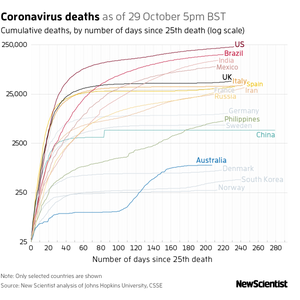
Matthew Rowett
The worldwide death toll has passed 1.17 million. The number of confirmed cases is more than 44.6 million, according to Johns Hopkins University, though the true number of cases will be much higher.
Latest on coronavirus from New Scientist
Long covid: Millions of people may be experiencing long-term symptoms after recovering from covid-19 – possibly because the virus is hiding from the immune system.
Essential information about coronavirus
Everything you need to know about the pandemic
Where did coronavirus come from? And other covid-19 questions answered
You could be spreading the coronavirus without realising you’ve got it
Which covid-19 treatments work and how close are we to getting more?
What are the main coronavirus vaccine candidates?
What to read, watch and listen to about coronavirus
Race Against the Virus: Hunt for a Vaccine is a Channel 4 documentary which tells the story of the coronavirus pandemic through the eyes of the scientists on the frontline.
The New York Times is assessing the progress of different vaccine candidates and potential drug treatments for covid-19, and ranking them for effectiveness and safety.
Humans of COVID-19 is a project highlighting the experiences of key workers on the frontline in the fight against coronavirus in the UK, through social media.
Coronavirus, Explained on Netflix is a short documentary series examining the on-going coronavirus pandemic, the efforts to fight it and ways to manage its mental health toll.
New Scientist Weekly features updates and analysis on the latest developments in the covid-19 pandemic. Our podcast sees expert journalists from the magazine discuss the biggest science stories to hit the headlines each week – from technology and space, to health and the environment.
COVID-19: The Pandemic that Never Should Have Happened, and How to Stop the Next One by Debora Mackenzie is about how the pandemic happened and why it will happen again if we don’t do things differently in future.
The Rules of Contagion is about the new science of contagion and the surprising ways it shapes our lives and behaviour. The author, Adam Kucharski, is an epidemiologist at the London School of Hygiene and Tropical Medicine, UK, and in the book he examines how diseases spread and why they stop.
Previous updates

FRIEDEMANN VOGEL/EPA-EFE/Shutterstock
28 October
European countries see record high numbers of new daily coronavirus cases
Nearly half of the world’s new daily coronavirus cases are now occurring in Europe, with Germany, Poland and the Czech Republic among those European countries reporting new records in their numbers of daily cases. Poland today reported 18,820 new cases, Czech Republic 15,663 and Germany 14,964, the highest daily jumps recorded in these countries since the start of the pandemic. Switzerland and Slovenia also reported their highest daily increases in infections yet, while Russia and Ukraine reported their highest daily death tolls. The UK reported 24,701 new coronavirus cases today and 310 deaths.
The World Health Organization (WHO) warned yesterday that Europe is “well behind” in its battle against the second wave of the virus. “There’s no question that the European region is an epicentre for disease right now,” the director of the WHO’s health emergencies programme, Mike Ryan, told a media briefing. “Right now we are well behind this virus in Europe so getting ahead of it is going to take some serious acceleration in what we do and maybe much more comprehensive nature of measures that are going to be needed.” Peter Piot at the London School of Hygiene and Tropical Medicine echoed Ryan during a media briefing today, saying Europe had “relaxed too much” and was therefore seeing a “resurgence” in cases. Piot is advising the European commission on coronavirus.
Many European governments are either imposing new lockdowns or considering them. Ireland and Wales have already imposed nationwide lockdowns this month, and Italy introduced strict new rules earlier this week. Germany and France are expected to make decisions on new lockdowns this week. German chancellor Angela Merkel met with German state leaders today to decide whether to shut bars, leisure centres and hotels completely and whether to introduce other restrictions – nicknamed “lockdown light” by German media – such as limits on social contact and making restaurants takeaway-only. Meanwhile, France is deciding on the extent of a planned four-week lockdown, which could come into force this Thursday.
In the UK, one of the government’s scientific advisors said that without further lockdown measures, the number of covid-19 patients in hospitals could pass the spring peak by the end of November. Mark Walport told BBC Radio 4 that without such measures, it was “not unrealistic” that there would be 25,000 people in hospital with covid-19 by the end of next month – higher than the peak of 19,849 on 12 April. Currently, there are more than 9000 patients in hospital with covid-19 in the UK. “France, which has a very similar population to us, currently has about 16,000 people in hospital,” Walport said. “We’re seeing similar things in Spain.”
Other coronavirus news
China has reported its highest daily increase in new coronavirus cases in more than two months. There were 42 new cases confirmed in mainland China on Tuesday, the highest figure since 44 cases were reported on 10 August. The spike is mainly being driven by a rise in infections in the northwestern region Xinjiang, where local authorities recently tested about 4.7 million people living in the city of Kashgar.
The Trump administration claimed yesterday that “ending the pandemic” was one of its major “first-term scientific accomplishments”, in a press release sent to reporters. The US has reported a record of more than 500,000 new coronavirus cases within the past week, and the number of cases is now rising in almost every US state. More than 8.7 million cases and 226,000 deaths have been recorded in the US since the pandemic began.
Coronavirus deaths
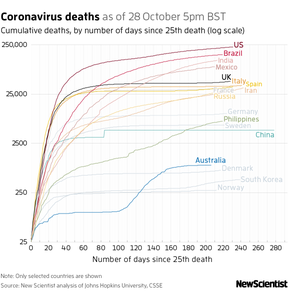
Matthew Rowett
The worldwide death toll has passed 1.16 million. The number of confirmed cases is more than 44.1 million, according to Johns Hopkins University, though the true number of cases will be much higher.
Latest on coronavirus from New Scientist
Rebuilding after covid-19: The pandemic has highlighted huge weaknesses in our economic systems. New Scientist asked six leading economists how to redesign it to reduce inequality and save the planet.
Lockdown lifted: Australians have been celebrating the end of a strict lockdown in Melbourne after cases of coronavirus were eliminated in the state of Victoria.
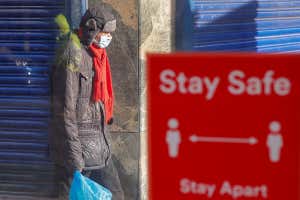
REUTERS/Andrew Couldridge
27 October
More than 60,000 people in the UK have died from covid-19 since the pandemic began
The death toll from covid-19 in the UK has hit 61,116 people since the start of the pandemic. In England and Wales, there were 670 deaths mentioning covid-19 on the death certificate during the week ending 16 October, up from 438 the previous week. It is the sixth consecutive week where the number of deaths has risen, according to the Office for National Statistics. The north west of England has been the region hardest hit by the second wave of coronavirus, with 229 deaths from covid-19 over the same period. Today the UK as a whole recorded 22,885 new cases and 367 deaths, the highest daily number of deaths in the country since 27 May.
Long-term exposure to air pollution may increase the risk of dying from covid-19
Exposure to air pollution may increase the risk of dying from covid-19, with about 15 per cent of global coronavirus deaths estimated by researchers to be attributable in part to long-term air pollution exposure. Researchers used satellite data to calculate global exposure to fine particulates – particulate matter with a maximum diameter of 2.5 micrometres, also called PM2.5 – as well as data on covid-19 deaths from the US and China, to estimate the degree to which air pollution exposure influences covid-19 mortality. They estimate that particulate air pollution has contributed to 15 per cent of global covid-19 deaths, 27 per cent in East Asia, 19 per cent in Europe and 17 per cent in North America. “When people inhale polluted air, the very small polluting particles, the PM2.5, migrate from the lungs to the blood and blood vessels, causing inflammation and severe oxidative stress,” said study author Thomas Münzel at Johannes Gutenberg University in Germany in a statement. “The [coronavirus] also enters the body via the lungs, causing similar damage to blood vessels,” said Münzel, which may have an “additive adverse effect on health”. The study was published in the journal Cardiovascular Research.
Other coronavirus news
The percentage of people in England with coronavirus antibodies fell from 6 to 4.4 per cent between 20 June and 28 September, according to preliminary results from Imperial College London’s REACT-2 study. The study included more than 365,000 people across England, who took finger-prick antibody tests at home. It still isn’t clear whether antibodies provide immunity to the coronavirus or for how long such immunity might last. “It would be premature to assume that this means that immunity to [the coronavirus] does not last,” said Eleanor Riley at the University of Edinburgh in a statement. “The study does not look at antibody concentrations, antibody function or other aspects of immunity such as T-cell immunity.” The study has not yet been peer-reviewed.
A letter signed by more than 50 MPs calls on UK prime minister Boris Johnson to outline a roadmap out of coronavirus restrictions for the north of England. Much of the region is currently under strict tier three rules.
Coronavirus deaths
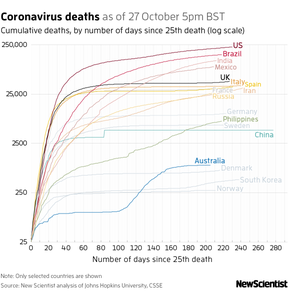
Matthew Rowett
The worldwide death toll has passed 1.16 million. The number of confirmed cases is more than 43.6 million, according to Johns Hopkins University, though the true number of cases will be much higher.

Natacha Pisarenko/AP/Shutterstock
26 October
Oxford coronavirus vaccine seems to produce an immune response in people over 55
The University of Oxford coronavirus vaccine candidate has been found to produce an immune response in people over the age of 55. The results are encouraging because older people are at an increased risk of becoming severely ill and dying from covid-19, partly because the immune system weakens with age. The finding, which has not yet been published, builds on results from July which found that the vaccine also produces an immune response in younger adults, aged between 18 and 55. The vaccine candidate is being developed by pharmaceutical company AstraZeneca in partnership with the University of Oxford. “It is encouraging to see immunogenicity responses were similar between older and younger adults,” an AstraZeneca spokesperson told CNBC today.
UK health minister Matt Hancock today said the government was preparing to roll out a coronavirus vaccine and expects it will be ready in the first half of 2021. Hancock also said that he doesn’t rule out the possibility that some people could receive a vaccine this year. Yesterday, US health adviser Anthony Fauci said it should be known by the end of November or early December if a coronavirus vaccine candidate was safe and effective. Fauci, speaking on the BBC’s Andrew Marr Show, added: “The question is, once you have a safe and effective vaccine, or more than one, how can you get it to the people who need it as quickly as possible?”
Other coronavirus news
The city of Melbourne, in south east Australia, will exit its strict coronavirus lockdown from Wednesday, after more than three months. Deaths in Victoria state, of which Melbourne is the capital, accounted for more than 90 per cent of deaths from covid-19 in Australia’s second wave. But after its first day with no new coronavirus cases since June, authorities announced that restrictions could gradually be lifted. “With zero cases and so much testing over the weekend […] we are able to say that now is the time to open up,” Victoria’s premier Daniel Andrews told journalists today. From Wednesday, people in Melbourne will be allowed to leave their homes freely, and bars, shops and restaurants will be permitted to reopen.
As coronavirus cases surge in the US, White House chief of staff Mark Meadows said that the country is “not going to control the pandemic”. Speaking on CNN’s State of the Union show yesterday, he said: “What we need to do is make sure that we have the proper mitigation factors, whether it’s therapies or vaccines or treatments to make sure that people don’t die from this.” More than 225,000 people in the US have died from covid-19 since the start of the pandemic, according to Johns Hopkins University. The US reported 83,718 new coronavirus cases on Saturday, almost as many as the country’s current record for daily new cases of 83,757 set on Friday.
UK pharmacy chain Boots today announced it will start offering 12-minute coronavirus tests for people without symptoms in November. The tests will cost £120 and will be available in selected UK stores. While a negative test result may give people peace of mind at the time it is taken, Paul Hunter at the University of East Anglia told the BBC: “A negative test today tells you nothing really about whether you are going to be positive a day or two later.”
Coronavirus deaths
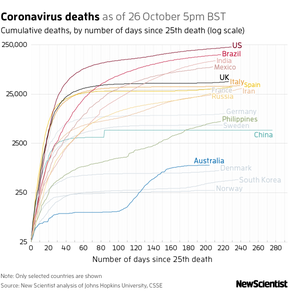
Matthew Rowett
The worldwide death toll has passed 1.15 million. The number of confirmed cases is more than 43.1 million, according to Johns Hopkins University, though the true number of cases will be much higher.
Latest on coronavirus from New Scientist
Covid-19 response: Cutting transmission of the coronavirus is vital to prevent hospitals being overwhelmed and schools shutting, but also to stop it evolving.
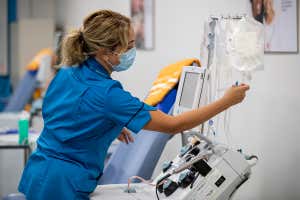
Peter Byrne/PA Wire/PA Images
23 October
Study finds convalescent plasma treatment is of limited benefit in covid-19
Transfusions of plasma from people who have recovered from covid-19 offer limited benefit in terms of saving lives or reducing the severity of illness, a study has found. Convalescent plasma – a component of blood from people who have recovered from covid-19 – is being collected by NHS Blood and Transplant for use in studies in the UK, and was granted an emergency use authorisation by the US Food and Drug Administration (FDA) in August, despite limited evidence that it had an effect. Convalescent plasma was used as a treatment for more than 100,000 patients admitted to hospital with covid-19 in the US between April and August.
The study, which was published in the BMJ, included 426 participants across 39 hospitals in India, about half of whom were randomised to receive two doses of convalescent plasma given 24 hours apart. It found that convalescent plasma was not associated with a reduction in progression to severe covid-19 or death within 28 days. An NHS Blood and Transplant spokesperson said that UK-based studies are only infusing plasma that contains higher levels of coronavirus antibodies than the plasma that was used in this recent study. “This was a trial which used donations with antibody levels around 6 to 10 times lower than we are using,” they said in a statement.
Other coronavirus news
Tests for the coronavirus in sewage are being used to try to predict where new outbreaks might occur. A sewage sampling programme has been piloted in the south-west of England since June, and has already detected a spike in cases in the region and alerted NHS Test and Trace, according to the UK government. The programme is now being rolled out across more than 90 wastewater treatment sites in the UK, which cover about 22 per cent of the population of England.
Parts of Nottinghamshire and West Yorkshire may be put under strict tier three restrictions from Wednesday. Talks are underway between the UK government and local leaders. Tier three rules came into force today in Greater Manchester in England, and Wales will enter a 17-day lockdown starting at 6 pm. South Yorkshire in England will move into tier three from Saturday.
The antiviral drug remdesivir has been approved by the FDA as a treatment for people hospitalised with covid-19, despite a recent World Health Organization study suggesting it has little effect on survival in covid-19. It is the first drug in the US to receive approval for the treatment of covid-19.
Travellers returning to Australia may soon be allowed to opt to be put under surveillance through a smartphone app or a wearable tracking device so they can quarantine at home, rather than in a hotel, a government review suggests.
Coronavirus deaths
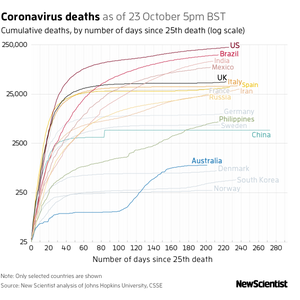
Matthew Rowett
The worldwide death toll has passed 1.13 million. The number of confirmed cases is more than 41.8 million, according to Johns Hopkins University, though the true number of cases will be much higher.
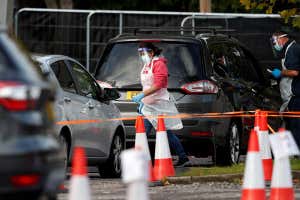
ADRIAN DENNIS/AFP via Getty Images
22 October
NHS Test and Trace reaches lowest ever percentage of the contacts of virus cases
For the third consecutive week, England’s contact tracing system reached a record low percentage of people who had come into contact with someone who tested positive for the coronavirus. Only 59.6 per cent of the contacts of those who were diagnosed were reached by NHS Test and Trace and told to self-isolate in the week up to 14 October, down from 62.6 per cent the previous week and the lowest figure since the system launched in May. UK government scientific advisers recommend a target of 80 per cent or more to limit infections from spreading. “[The latest figures] show a system struggling to make any difference to the epidemic”, said James Naismith at the University of Oxford in a statement.
The system also returned a record low percentage of coronavirus test results within 24 hours – just 7.4 per cent of people received their results within a day. In early June, UK prime minister Boris Johnson told parliament all covid-19 tests would be returned within 24 hours by the end of the month. “We recognise that testing turnaround times must improve and we are working hard to address this,” Johnson’s official spokesperson told the Huffington Post.
Other coronavirus news
People from Black, Asian and other ethnic minority groups in England are at an increased risk of getting infected with the coronavirus and dying from covid-19, and part of this excess risk remains unexplained, according to a report released today by the UK government’s Race Disparity Unit. The report says “current evidence clearly shows that a range of socioeconomic and geographical factors such as occupational exposure, population density, household composition and pre-existing health conditions contribute to the higher infection and mortality rates for ethnic minority groups” but don’t account for all of the increased risk. In response, Chaand Nagpaul, British Medical Association council chair, called for “tangible action right now” to protect Black, Asian and minority ethnic people. “As we sit amid a second wave of infections, we know that about a third of those admitted to intensive care are not white – showing no change since the first peak,” said Nagpaul in a statement. “Meanwhile, Black and Asian people have been found twice as likely to be infected compared to white people.” The report suggested measures to help investigate the disparity in England, which the UK government has accepted, including making the recording of ethnicity on death certificates mandatory.
In a trial of a potential coronavirus vaccine, a participant who reportedly did not receive the vaccine but instead got a placebo has died. The individual was taking part in a trial in Brazil of a vaccine candidate being developed by AstraZeneca in partnership with the University of Oxford. In a statement, AstraZeneca said “all required review processes have been followed”, adding that “assessments have not led to any concerns about continuation of the ongoing study”. The phase 3 trial was paused in September after a participant in the UK became ill. Trials have since resumed in the UK, Brazil, South Africa and India, although they remain suspended in the US.
Coronavirus deaths
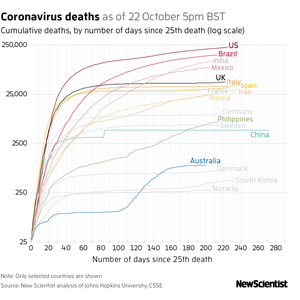
Matthew Rowett
The worldwide death toll has passed 1.13 million. The number of confirmed cases is more than 41.3 million, according to Johns Hopkins University, though the true number of cases will be much higher.
Latest on coronavirus from New Scientist
Social viruses: The coronavirus and others are no lone wolves, they cooperate and compete with one another. Understanding these social interactions could help us fight them.
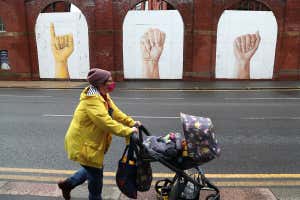
Lee Smith/REUTERS
21 October
South Yorkshire becomes latest region of England to face strictest virus rules
Sheffield and Doncaster will be put under strict tier three coronavirus restrictions from this Saturday along with the rest of South Yorkshire. “The number of people with covid in our hospitals has doubled over the last ten days, with no signs this will relent over the coming weeks,” Sheffield city region mayor Dan Jarvis said in a statement today. “Inaction was not an option.” He said that he and other local leaders had secured £41 million in funding from the UK government to support people and local businesses once the region is moved into tier three. Yesterday, the UK government announced that tier three rules will be imposed in Greater Manchester on Friday, against the wishes of local leaders who requested more funding to support businesses. Today, UK prime minister Boris Johnson announced a £60 million support package for the region, an increase from an initial £22 million package announced yesterday, but still less than the £65 million requested by local leaders. Tier three is the highest coronavirus alert level and means tighter restrictions on household mixing, as well as the closure of bars and pubs that do not serve meals. The Liverpool city region and Lancashire are already under tier three restrictions. By Saturday 25 October, 7.3 million people in England – 13 per cent of the population – will be living under tier three rules.
Scotland is expected to move to a tiered system of coronavirus restrictions on 2 November. Restrictions on hospitality venues in Scotland were today extended for another week after bars and restaurants in Scotland’s central belt area were closed on 9 October. Venues in other parts of the country are not allowed to serve alcohol indoors.
The UK as a whole recorded 26,688 new coronavirus cases today, a new daily record.
Other coronavirus news
New Zealand recorded 25 new coronavirus cases today, its biggest daily count since April. Two of the recent infections were locally acquired and the remainder were discovered at the New Zealand border, including 18 among Russian and Ukranian fishing crews who had arrived on a flight from Moscow. New Zealand has been widely praised for its aggressive response to the coronavirus, which is aimed at eliminating the virus from the country entirely.
Lockdowns have been reintroduced in regions of Spain and Italy, and Ireland will today become the first European country to return to a full, national coronavirus lockdown. Ireland is currently recording 270.8 virus cases per 100,000 people, compared to 348.7 per 100,000 people in the UK, according to the latest figures from the European Centre for Disease Prevention and Control (ECDC).
Coronavirus deaths
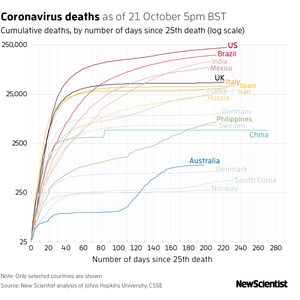
Matthew Rowett
The worldwide death toll has passed 1.12 million. The number of confirmed cases is more than 40.9 million, according to Johns Hopkins University, though the true number of cases will be much higher.
Latest on coronavirus from New Scientist
Changing virus: So far, we haven’t seen much change in the coronavirus, but as we develop more therapies and potentially a vaccine it could mutate.
UK infection survey: The UK’s flagship covid-19 infection tracking survey by the Office for National Statistics has been deluged by complaints, with volunteers calling it an “absolute shambles” and “disappointing and frustrating”.
Navigating uncertainty: Baffling statistics and their impact on our emotions can make it hard to evaluate risk in this pandemic. But there are simple steps you can take to put risk in context and feel more confident in your decisions.

Credit: Jacob King/PA Images
20 October
UK government imposes tier three virus rules in Greater Manchester despite local disagreement
The UK government in Westminster will impose tier three restrictions on Greater Manchester from Friday despite opposition from local leaders, who say the financial support for businesses that will be forced to close is inadequate. Tier three is the highest alert level and means tighter restrictions on household mixing, as well as the closure of bars and pubs that do not serve meals. Greater Manchester mayor Andy Burnham said the government had not offered enough money to “protect the poorest people in our communities.” UK prime minister Boris Johnson said at a televised briefing today that the region would receive £22 million in extra financial support. Burnham and other local leaders originally proposed a £90 million plan, which they reduced to a request for £65 million during talks with Johnson today.
The UK government also signalled today that Sheffield and Leeds could be the next areas facing tier three rules, as cases remain high in south and west Yorkshire. If this goes ahead, one third of the UK population could be living under stricter rules within days, as Wales is set to enter a nation-wide lockdown on Friday. Scotland’s first minister Nicola Sturgeon said at a briefing today that she expects to be able to announce plans for a tiered system of coronavirus restrictions in Scotland later this week.
Thousands of people living in Halton in the Liverpool city region, which is currently under tier three rules, have signed a petition asking for their area to be moved out of tier three. The number of cases in Halton fell from 399.5 to 338.5 per 100,000 people over the week leading up to 15 October. Tier three restrictions were first introduced in the Liverpool city region on 14 October, and are also in force in Lancashire and will soon be in Greater Manchester too.
London mayor Sadiq Khan today called for a 10 pm curfew on pubs and restaurants in the city to end, now that London is under tier two coronavirus restrictions. “We saw the worrying consequences of increased social mixing on the streets and on public transport in the capital around 10 pm immediately after its introduction,” Khan said in a statement. “Now London and other parts of the country have moved into tier two and higher restrictions, which prohibit household mixing, the current 10 pm curfew policy makes even less sense and should be scrapped.” Under tier two rules, people are not allowed to mix with people from other households indoors, but are allowed to visit pubs or restaurants with members of their own household or support bubble.
Other coronavirus news
To break the chains of coronavirus transmission in Europe, countries need to systematically quarantine people who have been in contact with those testing positive for coronavirus, said Mike Ryan, World Health Organization (WHO) director of health emergencies, at a virtual press briefing yesterday. “About half of our member states within the European region have experienced a 50 per cent increase in cases in the last week,” said Ryan. “If I was asked for one thing […] that might change the game here, that is: making sure that each and every contact of a confirmed case is in quarantine for the appropriate period of time, so as to break chains of transmission.” The WHO recommends that all contacts of people with confirmed or probable covid-19 be quarantined in a designated facility or at home for 14 days from their last exposure. “I do not believe that has occurred systematically anywhere, and particularly in countries that are experiencing large increases now,” said Ryan.
The UK recorded 21,331 coronavirus cases today, up from 18,804 yesterday, according to official figures. There were also 241 deaths from covid-19 – the highest daily figure recorded since 258 deaths were recorded on 5 June. Deputy chief medical officer for England, Jonathan van Tam, said during a press briefing today that he expects the upwards trend in deaths to continue.
Researchers in the UK announced plans to infect volunteers with the coronavirus as part of a “challenge trial” starting in January, although the study has not yet received final ethical approval. The initial aim of the trial will be to establish the minimum infectious dose before testing potential vaccines.
Coronavirus deaths
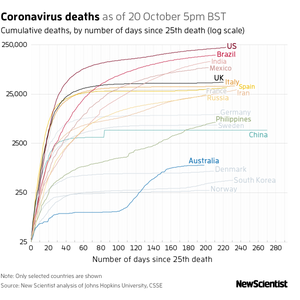
Matthew Rowett
The worldwide death toll has passed 1.12 million. The number of confirmed cases is more than 40.5 million, according to Johns Hopkins University, though the true number of cases will be much higher.
Latest on coronavirus from New Scientist
UK infection trial: A UK trial that involves intentionally infecting healthy volunteers with the coronavirus will start in January if approved by health authorities. The aim is to establish the minimum infectious dose before testing potential vaccines.
Coronavirus and TB: The covid-19 pandemic has collided with the ongoing tuberculosis epidemic, leaving many without adequate medical care and stuck at home, where they could pass an infection on to others.
More on these topics:
